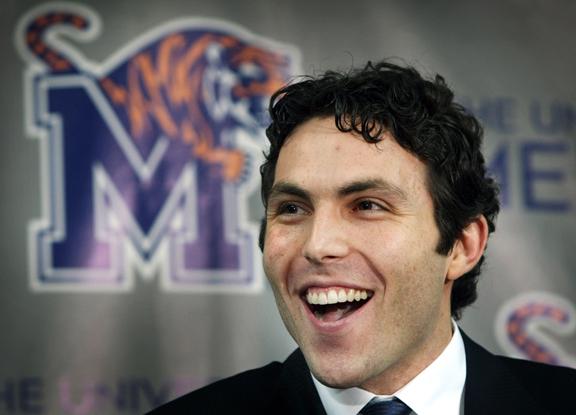Unrest In Memphis: Should Josh Pastner Be On The Hot Seat?
Posted by mlemaire on November 22nd, 2013There probably aren’t too many college basketball coaches who have found themselves on the hot seat just one season after winning more than 30 games, but after a disappointing loss to Oklahoma State on Tuesday that left him 0-13 against teams ranked in the AP Top 25, Memphis coach Josh Pastner is probably feeling a bit toasty. Tuesday’s showdown with the Cowboys was supposed to be an opportunity for Pastner’s Tigers to prove that they were ready for and deserved national recognition. Instead it served as the latest public service announcement on why you should never trust Memphis in big games. Sure, Oklahoma State may have won the game anyway because Marcus Smart doesn’t belong in college basketball and Stillwater is not an easy place to play, but Memphis didn’t even make it competitive. It’s probably unfair to judge this year’s team based on its second game of the season, but Pastner shouldn’t get to be so lucky.
Pastner’s reputation as an up-and-coming coaching superstar didn’t really begin until he graduated fromArizona and became an assistant at his alma mater under Lute Olson in 2002. Pastner’s reputation as a tireless worker preceded him and he quickly used that work ethic to establish himself as one of the best recruiters in the entire country, luring stars like Channing Frye, Mustafa Shakur, and Chase Budinger to the desert with a combination of charm and persistence. That recruiting prowess (as well as Olson’s retirement) played a big role in Pastner moving on to become an assistant coach and lead recruiter at Memphis, working under the Godfather of Recruiting himself, John Calipari, for the 2008-09 season. Calipari resigned after the season to take the job with Kentucky and it looked like Pastner would follow Calipari to Lexington. But the college basketball coaching ranks were experiencing a bit of a youth movement and a passionate and energetic 31-year-old like Pastner was the poster boy for this shift.
When Memphis hired Pastner, it was coming off four-straight 30-win seasons and a recent spot in the NCAA Championship game under Calipari. Pastner was expected to keep the roster stocked with top-flight talent and maintain the momentum. But, now in his fifth season at the helm, replacing Calipari has proven more difficult than ever imagined. Pastner has won at least 24 games in every season he has coached at Memphis but he doesn’t have a single quality non-conference win on his resume and his only NCAA Tournament win was a squeaker over a Saint Mary’s team that had been in a play-in game two nights earlier. His best regular season win during that time may have been a season-opening win over Belmont in 2012 and his tenure has become better known for all the games he hasn’t won. Embracing the role as the cream of the crop in Conference USA can be both a blessing and a curse. On one hand, it has meant that Memphis will pile up wins and easily make the NCAA Tournament; on the other hand, it has meant that nobody takes them seriously until they prove they can either beat marquee opponents and/or win games when it counts.
Pastner has been given something of a free pass in the past few years because of all the regular season wins, but after the Oklahoma State debacle on Tuesday, the sheen has completely worn off and the rumblings about whether Pastner is anything more than a glorified recruit-whisperer are growing more audible by the day. Unfortunately for him, the people doing the rumbling may have a point. Offensive execution, taking care of the ball, and crunch-time performance are all hallmarks of well-coached and disciplined basketball teams that Memphis never exhibits on the big stage. The Tigers routinely rely on athleticism and jump-shooting when their offensive sets don’t work; they struggle to close out wins; and they turn the ball over at a prolific rate despite consistently having some of the best backcourt talent in the country.
In Pastner’s defense, building a great college basketball program takes a modicum of continuity that he has never been afforded. Players like Elliot Williams, Will and Antonio Barton and Adonis Thomas have all taken their talents to the next level before they were polished projects, and the steady stream of role players transferring out and junior college players transferring in seemingly never ends at Memphis. The constant re-shuffling has affected the program’s stability and it stands to reason that eventually Pastner will convince a few freshmen to stay on campus so that he can begin to build some continuity. Still, he recruited these players (especially Thomas and Will Barton) knowing fully well that they might not stick around for all four years and that is part of the risk that comes with recruiting the best players in the country. Calipari can generally get away with it because he is able to do it every year, and even he has seen the plan backfire on occasion (last season’s NIT team is a good example).
Continuously demonstrated recruiting ability has been known to give coaches an extended leash, but at a program with a long and storied tradition, up-to-date facilities, and fertile recruiting ground nearby, competing for National Championships is a realistic goal. Pastner’s teams haven’t come anywhere close to that goal. If he can’t turn things around this season and at least make a run in the NCAA Tournament, he may instead find himself as one of the most highly sought after assistant coaches in the country next year, which is a backhanded compliment if there ever was one.










































